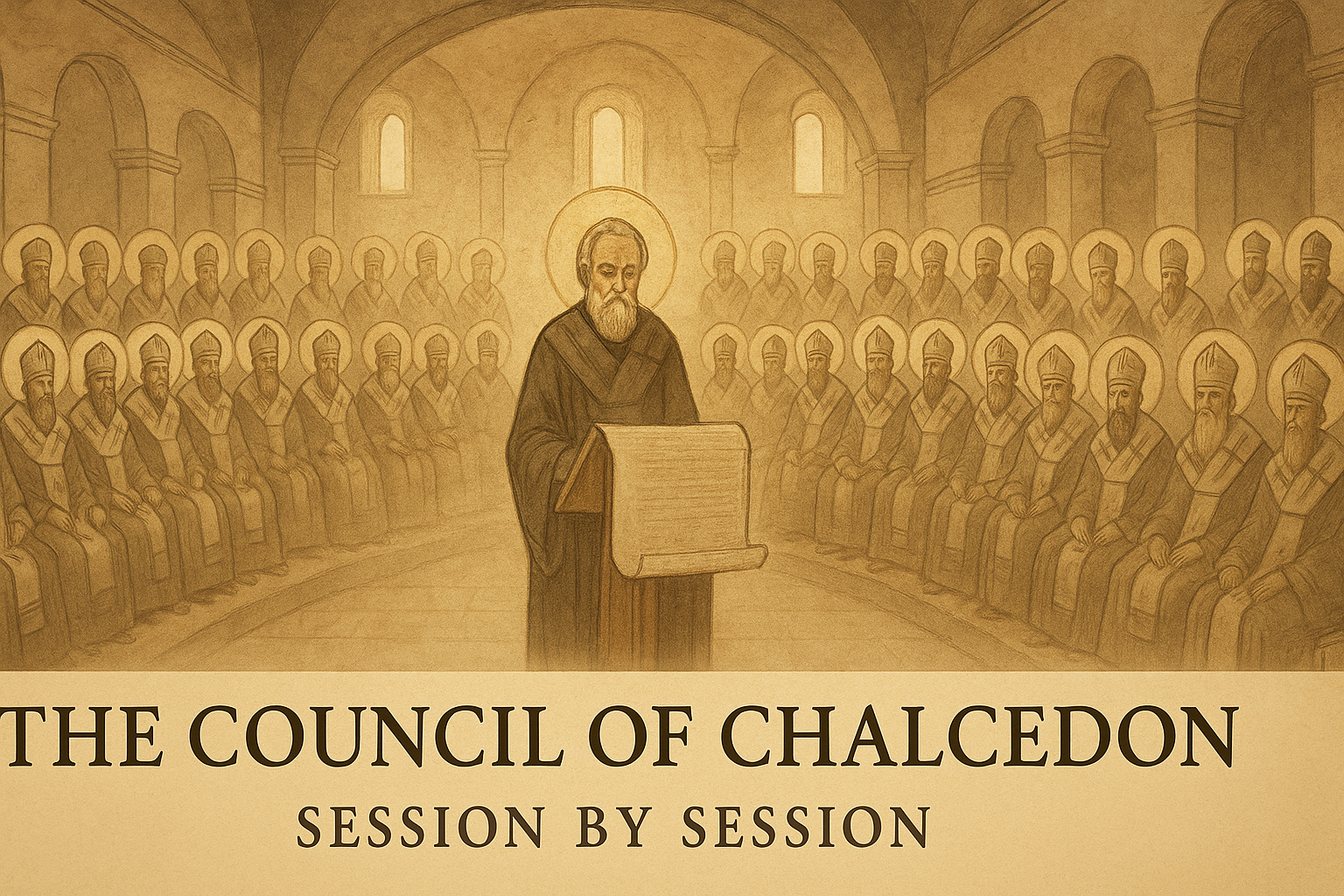Welcome to The Chalcedon Podcast Series—a historical audio series offering a session-by-session examination of the Council of Chalcedon, based on the official conciliar minutes and modern scholarly editions.
🧭 Purpose:
To provide listeners with a clear, documented account of the Council’s decisions, procedures, and theological conclusions—highlighting the reasons why the Oriental Orthodox Churches do not accept the Council of Chalcedon.
Note: This page is still under construction. Podcasts are still being added/revised.
🔊 Podcast Episodes
Overview – Introduction
Overview: Introduction
Session I – Opening Statements and Initial Tensions
Overview: The Council convenes with imperial backing. From the outset, signs of pre-set narratives emerge, including resistance to reviewing the Acts of Ephesus II.
Session II – Procedural Barriers
Overview: Requests to read the decisions of previous synods are denied. The rules of engagement become clear: some evidence is welcome, some is not.
Session III – The Deposition of Dioscorus
Overview: Dioscorus is deposed not for heresy, but for procedural reasons, including alleged refusal to appear and breach of communion with Rome. Anatolius of Constantinople would later affirm:“Dioscorus was not deposed on account of the faith.”
Session IV – Shifting Standards
Overview: Previously condemned bishops—including known supporters of Nestorian language—are restored to office, raising concerns about doctrinal consistency.
Session V – Definition Behind Closed Doors
Overview: The core Definition of Faith is drafted by a select few and presented for affirmation without debate. Most bishops simply sign, without recorded theological contribution.
Session VI – Signatures Under Pressure
Overview: The Council reaches its climax amid imperial expectations and pressure. The resulting definition becomes a dividing line in Christian history.
Session VII – Juvenal of Jerusalem
Overview: A look at Chalcedon’s Session VII, where the strategic rehabilitation of Juvenal of Jerusalem exposes the council’s political machinations and the seeds of the Oriental Orthodox schism.
Session VIII – Theodoret of Cyrus
Overview: Final confirmations, formalities, and the canonization of decisions that would deepen the split with the non-Chalcedonian churches for generations.
Session IX – IBas of Edessa
Overview: The podcast provides a forensic analysis of Chalcedon’s Session Nine, revealing procedural inconsistency, doctrinal injustice, and biased actions against Dioscorus and in favor of Ibas,
Session X – Ibas of Edessa
Overview: Restoration of a Nestorian: The transient “truth”
Session XI – Bassianus and Stephen
Overview: Chalcedon’s solution to a dispute over the bishopric of Ephesus – depose both bishops and start over.
Session XII – DEfinition of Chalcedon – Required Assent
Overview: The Definition is presented as a completed document, suggesting a predefined agenda where the majority of bishops were expected to simply ratify it
Session XIII – Suppresson and omission of information
Overview: Information suppressed and omitted; canons made without conciliar knowledge/assent
Session XIV – Athanasius of Perrhe
Overview: Like Dioscorus, he was deposed in absentia (at Antioch in 445 CE) for non-appearance. At Chalcedon, he was given provisional status; new investigation ordered with a path to potential reinstatement;
Examples of the subordination of theological integrity to political expediency at Chalcedon
| Figure/Council | Initial Status/Action | Chalcedon’s Treatment | Implied Reason/Outcome | Forensic Flag(s) Highlighted |
| Dioscorus of Alexandria | Condemned and deposed in absentia at Chalcedon (Session III) for non-appearance and misconduct. | Condemned definitively in absentia; charges shifted from heresy to procedural violations. | Political adversary of the new imperial regime and Rome. | Denial of a Fair Defense, Slander and/or the admission of slander against him, Anomalies in Procedural Integrity, Pre-scripted Judgments or Outcomes, Subordination of Theology to Politics or Imperial Will |
| Athanasius of Perrhe | Deposed in absentia at Antioch (445 CE) for non-appearance; reinstated at Ephesus II (449 CE) by Dioscorus. | Provisional status; new investigation ordered with a path to potential reinstatement; subjected to state laws if convicted of misdeeds. | Aligned with the new imperial agenda, despite past misconduct and association with annulled Ephesus II. | Anomalies in Procedural Integrity, Historical Contradictions, Double Standards, Admission of slander on his part, Subordination of Theology to Politics or Imperial Will |
| Theodoret of Cyrrhus | Condemned at Ephesus II for Nestorian views; prohibited from attending Antioch council by imperial edict. | Rehabilitated (Session VIII) with no repentance, but only a reluctant anathematizing of Nestorius, despite objections. | Political alignment with the new imperial order and Rome. | Rehabilitation of Known Heretics without demonstrating that they repented, Pre-scripted Judgments or Outcomes, Subordination of Theology to Politics or Imperial Will |
| Ibas of Edessa | Condemned at Ephesus II for Nestorian views and misconduct. | Rehabilitated (Sessions IX & X) with no repentance, but only a reluctant anathematizing of Nestorius, despite objections.. | Political alignment with the new imperial order and Rome. | Rehabilitation of Known Heretics without demonstrating that they repented, Pre-scripted Judgments or Outcomes, Subordination of Theology to Politics or Imperial Will |
Supporting Documents
- 📄 Miracle of St. Euphemia
-
🧾 Chronological Timeline of Events
💬 Feedback & Dialogue
We welcome respectful comments and insights. This series is a contribution to understanding—not argument. Unity must be founded on truth.

Thank you. Which podcast is this from and where can it be found?
Hi Abraham, the voices are AI generated. But the analysis is directly from/of the minutes of Chalcedon